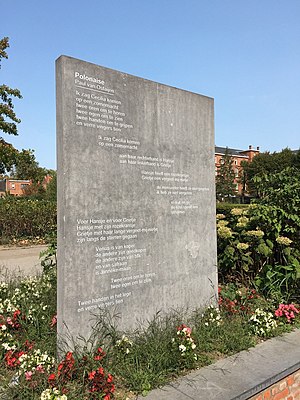Wikidata:Lexicographical data/Documentation/Languages/nl
Spelling
editLemmas and representations should be entered in the latest standard spelling as described by the Dutch Language Union (Q152299). This should be simply marked nl.
The single conjoined character "ij" (U+0133) should not be used. Only the two characters "ij" are to be used. The combined character's usage in Dutch computing environments is very rare; it exists in Unicode only as a compatibility character, and its use is discouraged.
Pronunciation
editDutch pronunciation may be entered in both phonemic (using / /) and phonetic form (using [ ]). The phonology of the two standard dialects, Netherlandic and Belgian Dutch, is more or less identical. Therefore, the phonemic transcription should indicate only the phonemes, not the dialectal or allophonic differences in pronunciation:
- /ɛi̯s/ and /œy̯t/ rather than /ɛːs/ and /œːt/
- /beːn/ and /boːm/ rather than /beɪn/ and /boʊm/
- /voːr/, /neːr/, /døːr/ rather than /vʊːr/, /vɔːr/, /nɪːr/, /dœːr/, /dʏːr/ etc.
- /x/ and /ɣ/ rather than /ç/, /ʝ/, /χ/ and so on. The voicing distinction between /x/ and /ɣ/ should always be maintained.
Vowel length should be included, as it is distinctive for some phonemes.
A highly standardized description of Dutch pronunciation is offered by Q64290453, also used in Van Dale (Q1482901) and Dutch Wiktionary (Q33108861). A short explanation can be found on Dutch Wiktionary (nl). When using this standard, it is useful to mention the source.
Gender
editGender in Dutch is described differently by different sources:
- Some describe only two genders, common (Q1305037) and neuter (Q1775461).
- Some describe three genders, masculine (Q499327), feminine (Q1775415) and neuter (Q1775461).
- The official Dutch standard prescribes four: m (masculine only), v (feminine only), n (neuter only) and v/m (feminine or masculine).
The standard's prescription is artificial and arbitrary, it does not reflect any historical fact nor the usage of any particular variety of Dutch. Speakers have either 3 genders (mostly in Belgium) or 2 genders (in the north), and the distinction between the standard's v and v/m is not made: two-gender speakers will consider them both to be common gender, three-gender speakers will consider them both to be feminine.
Entries on Wikidata should follow the three-gender scheme, which gives more information than the two-gender scheme. Variations in gender can be indicated with qualifiers. Only use common (Q1305037) if you don't know for sure.
Adjectives and adverbs
editEvery adjective can function implicitly as an adverb without any change in form. Dutch dictionaries do not indicate these adverbs, because they are implicit and predictable. Only adverbs that are not also adjectives, or those whose meaning is not transparently predictable from the corresponding adjective, are included. Wikidata should follow this practice.
Reflexive verbs
editReflexive verbs are verbs used together with the reflexive pronoun. Following the practice of the Dutch and English Wiktionaries, these should not be given separate lexemes, but rather included as a sense on the base verb. This sense can be marked with a property (to be determined) to indicate that it is reflexive.
External identifiers
editFor Old Dutch (Q443089) and Middle Dutch (Q178806):
- Oudnederlands Woordenboek GTB ID (P5937)
- Vroegmiddelnederlands Woordenboek GTB ID (P5938)
- Middelnederlandsch Woordenboek GTB ID (P5939)
Links to other dictionaries which don't yet have a dedicated property can be added using described at URL (P973).
External links
editOther online dictionaries/databases
edit- Algemeen Nederlands Woordenboek (ANW)
- Woordenboek van Nieuwe Woorden
- Vertaalwoordenschat
- woorden.org
- van Dale
- Uitleenwoordenbank van het Nederlands
Etymology:
Synonyms:
Collocations:
Dialects:
- Het Vlaams woordenboek
- Database van de Zuidelijk-Nederlandse Dialecten (DSDD)
- Elektronische Woordenbank van de Nederlandse dialecten (eWND)
- Woordenbank van de Nederlandse Dialecten
Wikidata Lexeme Forms
editDutch templates for the Wikidata Lexeme Forms tool:
- Nederlands onzijdig zelfstandig naamwoord
- Nederlands strikt mannelijk zelfstandig naamwoord
- Nederlands strikt vrouwelijk zelfstandig naamwoord
- Nederlands v/m zelfstandig naamwoord
Changes and new templates can be proposed on Wikidata:Wikidata Lexeme Forms/Dutch.
Wikifunctions
editFunctions on Wikifunctions for Dutch:
- ...
